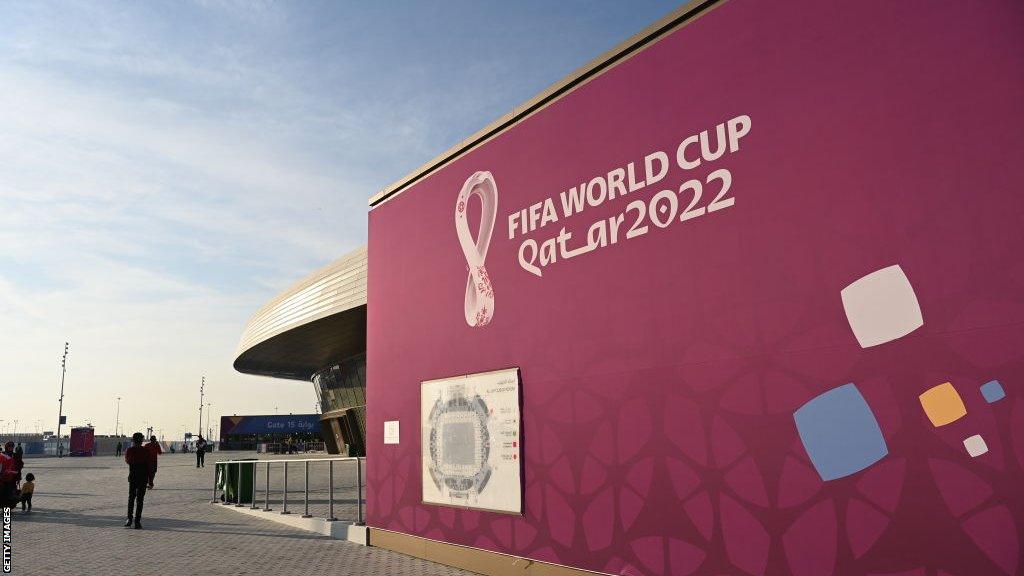World Cup 2022: Amnesty claims migrant workers paid 'unlawful recruitment fees'
- Published

Around 2,500 migrant workers were recruited by Teyseer for FIFA-related projects in Qatar
Thousands of migrants paid "illegal recruitment fees" to work at the 2022 World Cup in Qatar, Amnesty says.
Some allegedly paid in excess of ВЈ450, more than a third of their expected earnings, to gain employment with Qatar-based Teyseer Security Services.
The human rights body now wants Fifa to recompense the workers.
"Fifa has yet to effectively investigate," said Steve Cockburn, Amnesty International's head of economic and social justice.
"Qatar's existing mechanism for redress is not fit for purpose and has left thousands of workers deprived of compensation for the abuses they suffered.
"Fifa must now step in and offer immediate and meaningful remediation."
Teyseer denied the allegations, adding they "strictly follow ethical recruitment processes and standards, and all our agencies abide by them".
Amnesty said it had spoken with individuals from Nepal, Ghana and Kenya who were contracted by Teyseer to work for three months from mid-October, and all of them "incurred recruitment-related costs to secure their positions".
The investigation found that some handed over hundreds of pounds to secure roles as security guards and marshals.
Some workers paid for travel and accommodation to participate in a two-week training programme in their home countries, during which they were not paid.
Amnesty says it has seen job letters from Teyseer stating that "all recruitment-related costs" would be reimbursed.
Teyseer said they "covered all recruitment expenses" except for "attested police clearance certificates".
They added: "All selected candidates were informed to be cautious and vigilant when encountering any requests regarding payment during the recruitment process, and to contact our company if they encounter such situations."
Qatar told the ґуПуґ«ГЅ it was "proud to lead the region on labour rights", and "worked with global partners to implement a fair and effective labour system, which is supported by robust enforcement mechanisms to ensure compliance among all employers.
"Qatar strictly enforces its ban on illegal recruitment fees and contract substitution."
Hundreds of marshals staged a protest prior to the expiration of their contracts in early January, demanding reimbursement of their recruitment fees, unpaid overtime, and a bonus which they say was promised on completion of their duties.
Amnesty says workers were promised they would be compensated but that pledge has not been honoured. It adds that migrant workers who have left the country have no way of receiving remedy.
Qatar said its Workers Support and Insurance Fund "disburses unpaid salaries to workers, including those who have completed their employment and returned to their home country".
World governing body Fifa said it was made aware of Amnesty's allegations on 19 April and it "promptly followed up with the Supreme Committee's Worker's Welfare Department as well as with the Doha Office of the International Labour Organisation".
"Fifa, in collaboration with its Qatari counterparts, implemented a far-reaching due diligence process with the aim to ensure that companies involved in Fifa World Cup-related construction and services abide by the Supreme Committee's Workers' Welfare Standards," a Fifa spokesperson said.
"We consider any non-compliance with these standards unacceptable and are actively following up when we learn about alleged breaches."